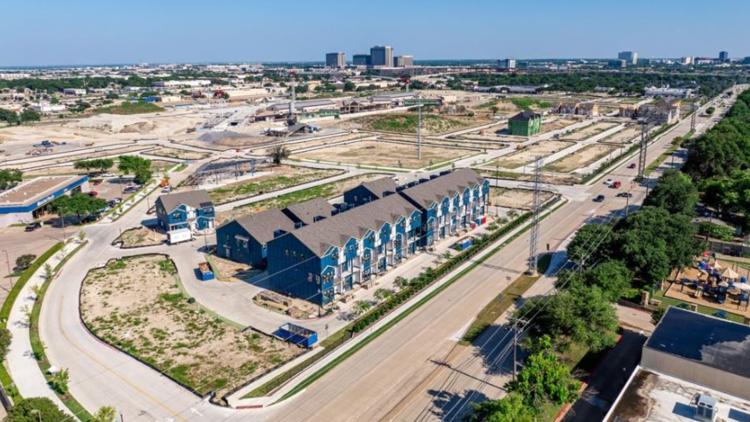PLANO, Texas — This story was originally published by our content partners at the Dallas Business Journal. You can read the original version here.
A row of blue townhomes now stands where the former Collin Creek Mall once sat, marking new strides of a $1 billion redevelopment project located just west of U.S. Highway 75.
These new single-family dwellings are officially for sale, with move-in units ready in October. Centurion American Development Group, one of North Texas's biggest developers, is spearheading the billion-dollar redevelopment initiative.
Homes in the master-planned community range from 1,522 to 2,413 square feet and are constructed by homebuilders Ashton Woods, Brightland Homes and Mattamy Homes. Prices range from $479,990 to $594,950.
“Partnering with the city of Plano has allowed us to reimagine a significant Collin County landmark in a way which retains the history of the original mall while creating a forward-looking community designed to bring Plano into its next century,” Mehrdad Moayedi, CEO of Centurion American, said in a statement.
Over 40 years ago, Collin Creek Mall was established as Plano's first large-scale shopping center, but the property lost its acclaim due to changing consumer habits, leading to its closure in 2019. In its prime, the mall paraded big-name anchor tenants such as J.C. Penney, Sears and Macy’s.
Through a public-private partnership, Centurion and the City of Plano aim to revitalize the old mall into a mixed-use district with new office, residential, hotel and retail space. A development agreement approved by Plano City Council in July 2019 created a framework for the public-private partnership.
Upon its completion, the project will include 500 single-family homes, 2,300 multi-family units and 300 independent living residences. In addition, Collin Creek will be home to 300,000 square feet of retail space which includes more than 60,000 square feet planned for restaurants.
Centurion formally broke ground on the site in 2021 and has since completed the construction of a $67 million underground parking garage with nearly 2,000 spots. The development firm bought the shopping mall in 2018 and subsequently presented a plan to city officials that called for demolishing most of the mall but keeping some of the existing structures, including the arched gateway into the mall, as an architectural beacon to the property’s past.



